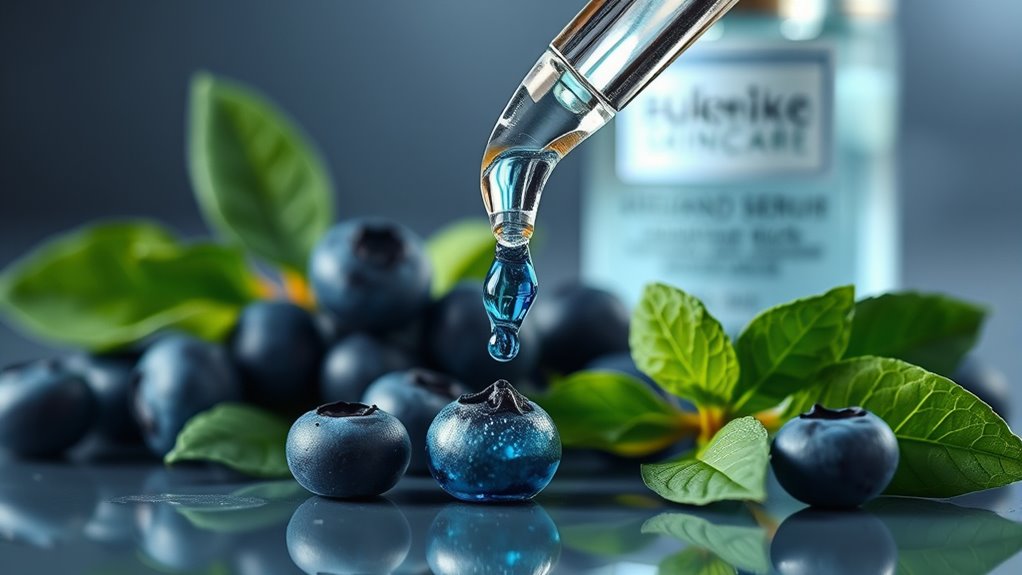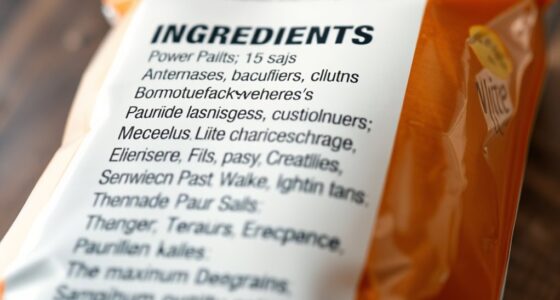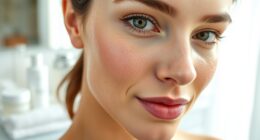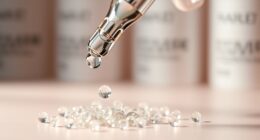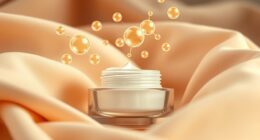Topical antioxidants can effectively protect your skin from blue light damage when used consistently. Ingredients like vitamin C, vitamin E, and ferulic acid neutralize free radicals and strengthen your skin’s natural barrier. This helps reduce dullness, fine lines, and oxidative stress caused by screen exposure. Remember, antioxidants work best when combined with other skincare measures and regular use. Curious about how to maximize your blue light defense? Keep exploring for more tips and strategies.
Key Takeaways
- Topical antioxidants can neutralize free radicals caused by blue light, reducing oxidative stress on the skin.
- Ingredients like vitamin C and E boost skin resilience and brighten complexion when applied regularly.
- Consistent use of antioxidants supports skin barrier health, preventing damage from environmental stressors.
- While beneficial, antioxidants should be combined with other protective measures like blue light glasses for optimal defense.
- Proper formulation and routine application are essential for topical antioxidants to effectively defend against blue light damage.
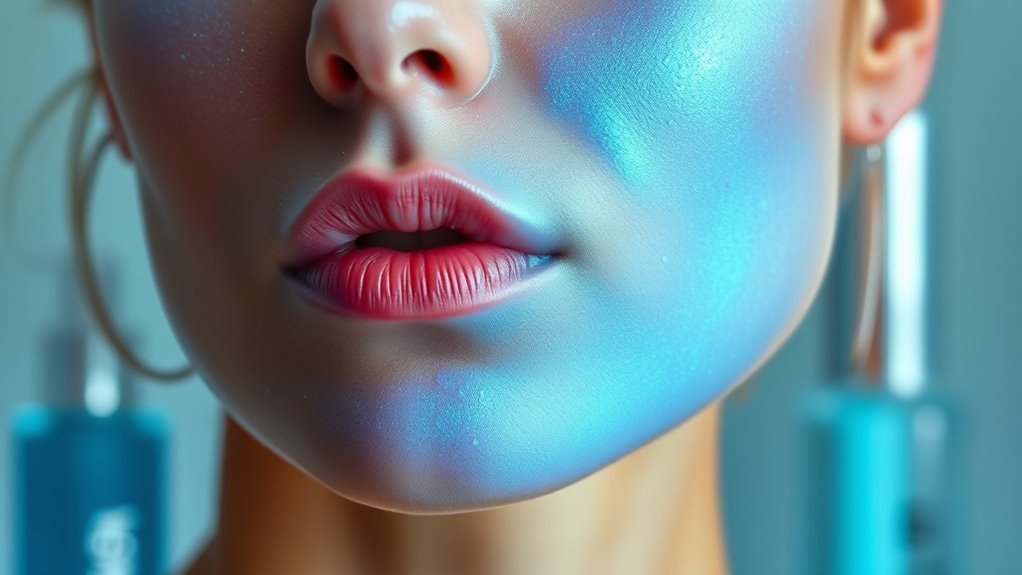
Have you ever wondered how your screens might be affecting your eyes and sleep? The blue light emitted by smartphones, tablets, and computers can do more than just cause eye strain; it can also impact your skin’s health. As you spend more time on screens, you might notice your skin looking dull or tired. This is where antioxidant formulations come into play. These topical products are designed to neutralize free radicals generated by blue light exposure, helping to protect your skin from oxidative stress. When applied consistently, antioxidant-rich serums or creams can reinforce your skin barrier, which is essential for defending against environmental damage. A strong skin barrier keeps moisture in and harmful elements out, making your skin more resilient against the effects of blue light.
Many skincare brands now emphasize antioxidant formulations because they recognize the potential damage blue light can cause at the cellular level. Ingredients like vitamin C, vitamin E, niacinamide, and ferulic acid are common in these products, and they work synergistically to combat oxidative stress. You might notice that using these antioxidants not only brightens your complexion but also provides a layer of defense, preventing premature aging signs like fine lines and wrinkles. It’s important to understand that antioxidants are most effective when they support your skin’s natural barrier function. A compromised skin barrier allows pollutants and irritants to penetrate more easily, increasing the likelihood of inflammation and skin sensitivity. Supporting skin barrier health is crucial for maximizing antioxidant benefits and maintaining overall skin resilience.
Incorporating antioxidant formulations into your skincare routine can be straightforward. Apply them after cleansing and before moisturizing, ensuring they have enough contact with your skin to work effectively. Consistency is key because antioxidants need time to build up in your skin and provide ongoing protection. Keep in mind that while topical antioxidants are helpful, they’re not a complete shield against blue light. Combining them with other protective measures, like wearing blue light glasses and reducing screen time before bed, offers a more inclusive approach. Ultimately, taking care of your skin’s barrier and adding antioxidant formulations can help mitigate some of the harmful effects blue light may have, leaving your skin healthier and more resilient in our digital age.
Frequently Asked Questions
Can Antioxidants Protect Against All Types of Blue Light?
You wonder if antioxidants can protect against all types of blue light. While their antioxidant efficacy can help reduce damage from blue light penetration, they may not block every wavelength entirely. Different blue light wavelengths penetrate skin differently, so antioxidants might offer partial protection. To maximize defense, combine antioxidants with other protective measures like screen time management and physical barriers. Remember, no single solution offers complete protection against all blue light exposure.
How Long Does It Take to See Results From Topical Antioxidants?
Think of topical antioxidants as a garden needing time to bloom; you won’t see results overnight. Typically, you can expect some visible improvements within a few weeks, but it varies based on your skin type and product consistency. For the best timing expectations, stick with your routine and be patient. Most users notice subtle changes in skin texture and brightness after 4 to 6 weeks of regular use.
Are There Any Side Effects From Using Blue Light Defense Products?
You might wonder if blue light defense products cause side effects. While generally safe, some people experience skin irritation or allergic reactions, especially if you have sensitive skin or allergies. It’s best to do a patch test first and read ingredient labels carefully. If you notice redness, itching, or swelling, discontinue use and consult a dermatologist. Being cautious helps prevent unwanted skin irritation or allergic reactions.
Do Antioxidants Provide Better Protection Than Sunscreen Alone?
You might wonder if antioxidants offer better protection than sunscreen alone. While antioxidants are known for their skin-repairing and anti-aging properties, their efficacy in blocking UV rays isn’t proven to surpass sunscreen’s proven UV protection. Sunscreen remains essential for blocking harmful UV radiation, but combining it with antioxidants can enhance your skin’s defense against environmental damage. So, for ideal protection, use both, rather than relying solely on antioxidants.
Can Dietary Antioxidants Replace Topical Blue Light Defense?
You might wonder if dietary antioxidants can replace topical blue light defense. While consuming foods rich in antioxidants supports overall skin health, their skin absorption is limited, making it hard to rely solely on them for direct blue light protection. Topical antioxidants, on the other hand, deliver active ingredients directly where needed. So, combining both approaches offers the best defense, but dietary antioxidants alone can’t fully replace topical blue light protection.
Conclusion
In the battle against blue light damage, topical antioxidants are your trusted allies, but they’re not miracle workers. While they can remarkably bolster your skin’s defenses, they won’t turn back the clock overnight. Think of them as your secret weapon in a war that’s ongoing—protecting your skin from invisible, relentless assaults. Incorporate them into your routine and give your skin the armor it deserves; after all, even the tiniest shield can stop an invasion of cosmic proportions.
